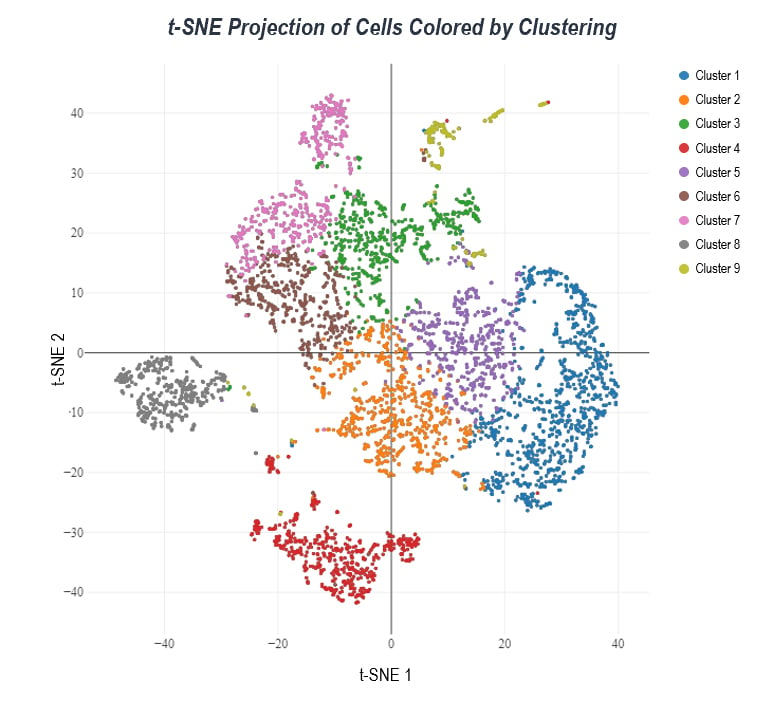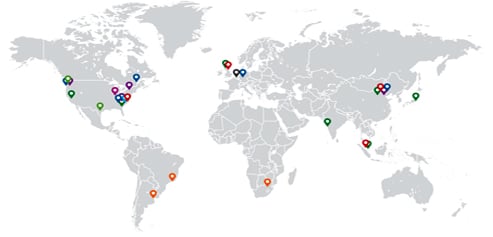
Single Cell RNA Sequencing
Accelerating research by exploring cellular heterogeneity, tracking population changes, and uncovering molecular interactions
10X Certified Service Provider
Single Cell Sequencing
Uncovering Cellular Diversity to Advance Clinical and Translational Research
Single cell sequencing is a next-generation sequencing method enabling in-depth characterization of biomolecules by uncovering genetic expression at single cell resolution. It has advantages over conventional bulk sequencing in its ability to detect rare cell types, uncover tumor heterogeneity, trace lineages, discover drug-resistant cell populations, and characterize complex cell populations such as immune cells in peripheral blood. IQVIA Laboratories utilizes leading technologies such as the 10x Genomics® Chromium™ and Illumina® NovaSeq™ platforms. We can meet your sequencing needs with our extensive services spanning the clinical research continuum combined with our global laboratory network and expert support team


IQVIA offers processing for the following sample types:
- Cryopreserved PBMCs
- Cryopreserved BMMCs
- Fixed single-cell suspensions
- Fresh frozen tissues (snap-frozen and OCT embedded)
- Formalin-Fixed, Paraffin-Embedded (FFPE)
- Single-nucleus suspensions
High Quality, High Throughput, High Satisfaction

Customizable Single-Cell Sequencing Solutions to Meet Your Research Needs

Single-Cell RNA-Seq
Profile over 10,000 cells per sample with our single cell RNA sequencing assay. Our assay provides 3ʹ or 5' digital gene expression using the Chromium microfluidic platform. Cryopreserved samples are thawed and prepared into single cell suspensions before loading into the Chromium instrument.

Single-Cell Immune Repertoire – TCR & BCR Profiling
Expand on the information gathered from single cell processing with our immune repertoire assay. Target full-length paired T-cell receptor or B-cell immunoglobulin (Ig) transcripts, including isotypes and T-cell receptor α/β.

Cite-Seq
Incorporate cell surface protein detection and antigen specificity analysis in conjunction with gene expression and immune repertoire profiling with our surface protein profiling assay.

Single-Nucleus RNA-Seq
Interrogate difficult to dissociate cell types and uncover complex heterogeneity with our single-nucleus assay. Use FFPE tissue to faithfully capture RNA expression by circumventing transcriptional changes induced by traditional dissociation.

Flex single-cell RNA-Seq for FFPE
Discover cellular insights and obtain gene expression data from challenging sample types, such as FFPE. Enhance sample processing efficiency by batching fixed cell suspensions, and reduce sequencing requirements utilizing the targeted probe based chemistry.
Supporting Studies Around the World
Our centralized scientific and operational oversight combined with our global laboratory footprint enables comprehensive, large-scale trial support. Expeditious delivery from your clinical site to one of our central labs is essential for maintaining the integrity of your samples. We can transport samples from almost anywhere in the world within a 24-48hr timeframe.

Simplify Your Work
Request a Quote
Request a quote today to discover how single cell sequencing with IQVIA can advance your research.
Ship Your Samples
Our global central laboratory network enables testing at a single site.
Get Your Results
Obtain in-depth data to understand gene expression, cell surface markers, immune cell repertoire, and much more.
Technology You Can Trust
Our assay acquires single cell resolution by partitioning individual cells into nano-liter gel beads where they undergo reverse transcription and cellular barcoding followed by library preparation and sequencing. Our validated sample handling procedures ensure reliable chain of custody.

Sample Preparation & Assessment
We carefully thaw your samples using our automated, temperature-controlled thaws for cryopreserved PBMCs, reducing the risk of operator variability, over thawing, and contamination. We also utilize high-throughput, automated cell counting and laminar flow cell washing protocols to reduce variability and enhance retention and viability.

Library Construction
Each cell is partitioned into nanoliter-scale Gel Beads-in-Emulsion (GEMs) and uniquely barcoded, allowing for labeling and profiling of individual cells. Multiple libraries can be constructed from a single sample, generating multiple readouts that can be linked back to the same single cell.

Sequencing
Prepared libraries are sequenced on Illumina® NovaSeq™ to enable high throughput, rapid, and deep sequencing for each cell.

Bioinformatics Analysis and Delivery
Rapid analysis of samples is enabled by robust computational architecture, a mature standard analysis pipeline, and a dedicated team of bioinformaticists. Upon request, an experienced data analytics team is available to consult on your research objectives and enable deep exploration of project data.
Frequently Asked Questions
What is single cell sequencing?
Single cell sequencing is a next generation sequencing method involving single cell isolation, transcriptome characterization, and sequencing library generation. Single cell sequencing uncovers heterogeneity at a high resolution by revealing cellular gene expression, quantity, and diversity in a sample.
What advantages does single cell sequencing have over traditional methods?
The main difference between single cell sequencing and traditional methods of bulk sequencing, qPCR, and flow cytometry is that single cell sequencing allows for characterization of heterogenous samples by profiling the whole transcriptome at a single-cell resolution. Our 96-throughput library preparation capability is a 12-fold increase over traditional methods. Single cell is often used in conjunction with traditional methods to obtain a comprehensive understanding of samples.
What controls do you have in place to limit variability?
We have automated various methods in our workflow to decrease variability. We automate temperature-controlled thaws to replace manual water baths, high-throughput cell counting to obtain objective percent viability and counting, and laminar flow cell washing to reduce manipulation and stress from traditional centrifugation methods. Additionally, we remove dead cells which, if left unaddressed, cause imperfect results and missed sequencing targets.
What data do I receive at the end of the experiment?
Core Deliverables
Per Sample Files
- FASTQ
- BAM
- 10x HTML QC
- Cluster CSVs indicating cluster for each cell
- Differential expression CSVs corresponding to each cluster CSV
- Principal Components Analysis CSVs
- tSNE projections CSV for the coordinates of each cell
- Raw and filtered feature barcode matrices containing cell UMI counts and gene annotation files (H5 and MTX)
- cloupe file for visualization and analysis in Loupe browser
- Compressed h5 files for use in different analysis programs
- Table containing one record per cellular barcode providing a prediction of dead cell status, multiplet status
Batch files
- Web Summary Report: contains summary of sequencing, alignment, estimated cells, dead cells, multiplets, and human cell type frequencies annotated using SingleR (exploratory)
TCR/BCR Data Files
- Heavy and Light Chain Clonotypes (BCR)
- Paired Clonotypes (TCR)
- Contig and Consensus sequences
- Metrics Summary
Can I customize the assay to fit my specific research needs?
Yes! We understand that no two research projects are exactly alike. We work with you to understand your particular research needs, and our team provides cost-effective recommendations to accomplish your goals. Contact our team today for more information about custom assay development and specialized bioinformatics support.
Where can I find answers to other frequently asked questions?
You can find additional answers on our General Genomics FAQ webpage.






















